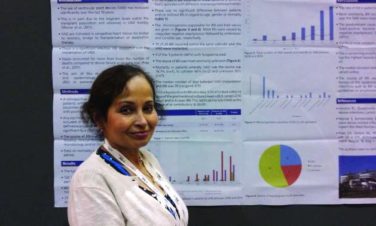AT THE LIVER MEETING 2014
BOSTON (FRONTLINE MEDICAL NEWS) – Treating recurrent hepatitis C infection after liver transplantation using sofosbuvir-containing regimens produced a sustained virologic response 4 weeks later in 60%-90% of 237 patients, depending on genotype and the presence of cirrhosis.
Investigators analyzed data on 245 posttransplant patients with hepatitis C (HCV) collected from 38 academic medical centers and 15 community medical centers in North America and Europe participating in the prospective, longitudinal, observational HCV-Target study. Of the 227 patients who started treatment, 69% completed treatment, 3% discontinued treatment prematurely, and 28% are undergoing treatment.
Among the 68 patients with HCV genotype 1 and a known virologic outcome who were treated with sofosbuvir and simeprevir with or without ribavirin, 61 (90%) achieved a sustained virologic response for 4 weeks (SVR4).
Response rates in that group varied, however, depending on whether patients had cirrhosis (SVR4 in 32 of 37, 86%) or no cirrhosis (SVR4 in 29 of 31, 94%). Results also varied in that group by genotype, with SVR4 in 30 of 36 patients with genotype 1a infection (83%) and SVR4 in 18 of 19 patients with genotype 1b (95%), Dr. Robert S. Brown Jr. and his associates reported at the annual meeting of the American Association for the Study of Liver Diseases.
“This is the regimen that probably holds the highest interest,” Dr. Brown said, because most of the patients in the study were genotype 1, and most genotype 1 patients received sofosbuvir and simeprevir with or without ribavirin.
A total of 10 of 12 patients with HCV genotype 1 infection who were treated with sofosbuvir plus pegylated interferon and ribavirin achieved SVR4 (83%).
A total of 9 of 10 patients with HCV genotype 2 infection who had complete data and who received sofosbuvir plus ribavirin achieved SVR4 (90%), reported Dr. Brown, the Frank Cardile Professor of Medicine and Pediatrics (in Surgery) at Columbia University, New York, and director of the Center for Liver Disease and Transplantation at New York-Presbyterian Hospital/Columbia University Medical Center.
Three of five patients with genotype 3 infection and complete data who received sofosbuvir plus ribavirin achieved SVR4 (60%), and one patient with genotype 3 achieved SVR4 after treatment with sofosbuvir, pegylated interferon, and ribavirin.
Adverse events were reported by 82% of patients, with rates ranging from 77% to 92% in different treatment groups. “The majority of these were mild and manageable,” Dr. Brown noted. The overall rate of serious adverse events was 8%, ranging from 0% to 21% in different treatment groups, though some of those cases were unlikely to be related to treatment, he added.
In general, interferon-free regimens had low rates of serious adverse events, Dr. Brown said. No patients developed acute liver graft rejection.
“Hepatitis C following liver transplant does remain a problem in 2014, because reinfection is universal and therapeutic options, at least to date, have been limited,” he said. The study’s real-world data supplement encouraging results from small, controlled trials of newer anti-HCV agents in posttransplant patients.
Most of the patients in the study were treated for recurrent HCV “well after” transplantation, Dr. Brown said. “The optimal treatment regimen and the duration of therapy still remain to be determined.”
Treatment regimens in the HCV-Target study are selected by physicians according to the local standard of care.
The study was too small to do a multivariate analysis of predictive factors for SVR4, Dr. Brown commented.
The HCV-Target study was funded by AbbVie, Bristol Myers Squibb, Genentech, Gilead, GlaxoSmithKline, Kadmon, Janssen, Merck, and Vertex. Dr. Brown reported financial associations with AbbVie, Genentech, Gilead, Janssen, Merck, Salix, Vertex, and Vital Therapies.
On Twitter @sherryboschert




